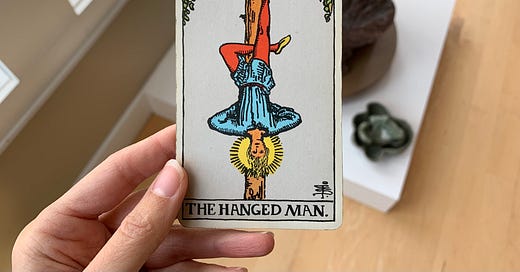Image description: A hand is holding a Tarot card, The Hanged Man, by Pamela Colman Smith in front of a wooden floor and a sculpture on a white stand next to a window. In the card, a person is hanging upside down on a tree by one foot with their other leg folded behind them. They’re wearing red leggings, yellow shoes and a blue tunic with a belt cinched around the waist. Their facial expression is stoic and there is a halo around their head.
When I first read Melody Beattie’s Codependent’s Guide to the Twelve Steps, I was impressed by the simplicity and effectiveness of the language. All the God stuff didn’t bother me. I was deep in Meditations on the Tarot at the time, and feeling pretty religious anyway, so it was good timing. The book was helpful.
Those were the years that I’d started to notice my tendency to use blame as a coping mechanism. Don’t get me wrong, being able to say “hey, I've been wronged here” is important. It’s not easy for everyone to do. But that wasn't something I ever had trouble with. One of my many struggles has been learning how to identify and stay with intense feelings without needing to make someone wrong.
Beattie's book is a lot about learning how to re-orient your attention in two ways. One, toward the things you have some degree of control over. And two, toward whatever higher force you believe is at work beyond what you personally would like to see happen.
She details the many surprising ways efforts to control others can look. It’s a lot more than just telling people what to do. It's ignoring your own wants and needs to win favor with others; a subtle move to control people’s perceptions of, feelings toward and behavior with you. It’s getting caught in blame loops where if only someone was different or would do x, y, or z, you’d be okay. Or feel valued.
I think it’s important to name that there are situations in which we are entangled inextricably with others, and actually do need them to change in order to be safe or okay. But I’ve also found that there are real times when refocusing my attention onto myself and what’s in my control can be really empowering. It’s a simple technology that can be deceptively challenging.




